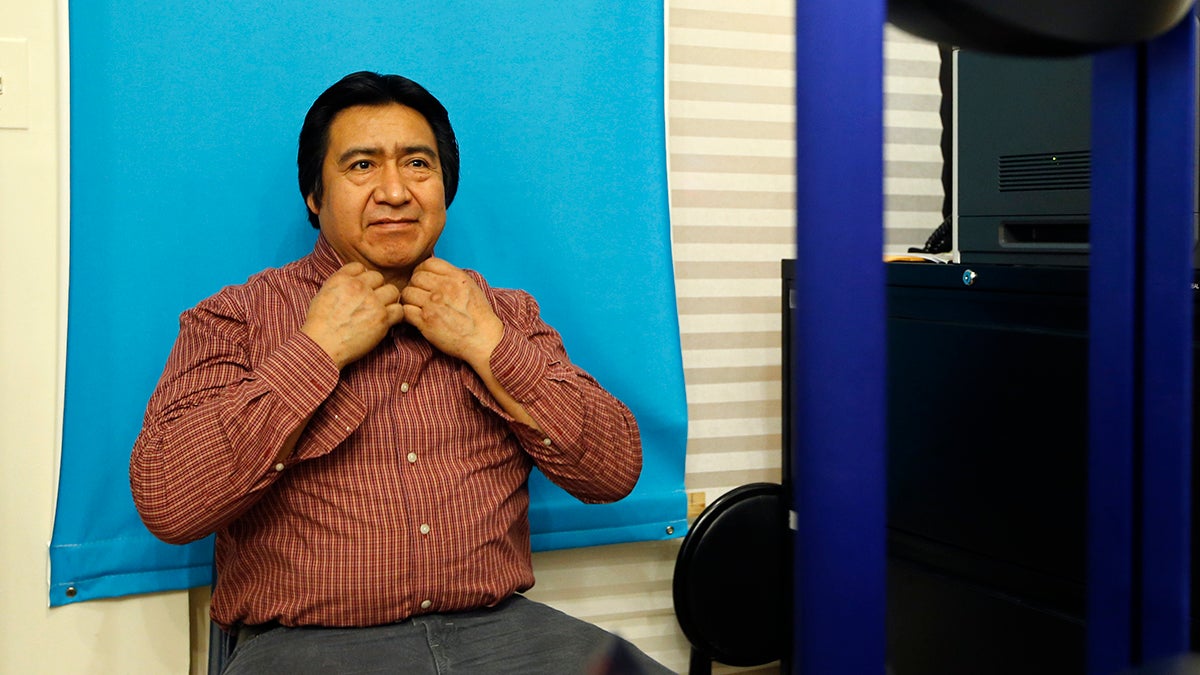Ideas Worth Stealing: Municipal IDs to integrate immigrants into civic life

Luis Gordillo, a carpenter from Ecuador, adjusts his shirt collar as he has his picture taken while applying for a New York City municipal ID card. (AP Photo/Kathy Willens)
Municipal identification cards are one initiative that a growing list of cities have introduced or are exploring.
Ideas Worth Stealing: Every week, Keystone Crossroads will look to cities across the world for lessons in urbanism and municipal governance that could benefit Pennsylvania. No city does it all right, and we hope these examples from metropolises near and far inspire and encourage cities here to think outside the box.
Immigration laws are set at the national level, but Congress continues to struggle with passing meaningful immigration reform. While some communities have channeled the frustration of the standstill to pass their own restrictive laws aimed at immigrants without documents, other states and cities are working locally to serve and integrate their immigrant populations.
Municipal identification cards are one initiative that a growing list of cities have introduced or are exploring.
Municipal IDs are generally offered to all residents of a city, but are particularly useful to populations who may not be able to obtain other forms of identification, like a driver’s license or passport. That includes undocumented immigrants, people who are homeless, and youth in foster care.
ID holders can use the cards for everything from interacting with law enforcement, to opening bank accounts and cashing checks, signing up for city services, renting housing, getting a library card, to filling prescriptions. Proponents also say there’s a less tangible good that comes from municipal IDs: a sense of acceptance and membership in the community where one lives.
The largest municipal ID program is New York City’s; to encourage all New Yorkers to sign up — and thus avoid the municipal ID from becoming a stigmatizing form of identification — the city offered free admission with the ID to a wide range of cultural institutions, like museums. So far, more than 400,000 ID cards have been issued, with thousands more in progress.
Other cities with municipal ID programs include New Haven, San Francisco, Los Angeles, and several communities in New Jersey.
In the Pennsylvania legislature a bill allowing undocumented immigrants to apply for drivers’ licenses has been sent to committee, but has not seen further action. And some cities in Pennsylvania have been considering issuing municipal IDs. Pennsylvania has one of the fastest growing undocumented immigrant populations in the country and a majority of those immigrants live in metropolitan areas.
Philadelphia, which has seen an uptick in the number of immigrants, has considered starting a municipal ID program. Philadelphia’s Democratic mayoral candidate, Jim Kenney, has said his public safety agenda will include municipal IDs if he’s elected.
Pittsburgh has been working on attracting immigrants to the city to bolster its population and the Welcoming Pittsburgh plan includes municipal IDs on its long list of goals.
Municipal IDs have come up in Allentown, as well. In Bethlehem there’s been no discussion of it by council, but the police chief preemptively expressed concern about the idea.
Opponents say municipal IDs could lead to more unlawful activity and have questioned the investment necessary to sustain a local ID program.
For now, there are no municipal ID programs in any of Pennsylvania’s largest cities.
But as demographics change in the Commonwealth, and as cities actually seek out immigrants, some of whom will undoubtedly be undocumented, to stabilize their populations and infuse entrepreneurship into their economies, that could change. It may have to.
WHYY is your source for fact-based, in-depth journalism and information. As a nonprofit organization, we rely on financial support from readers like you. Please give today.


